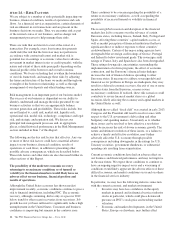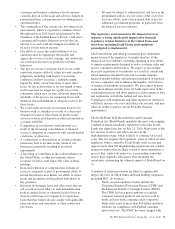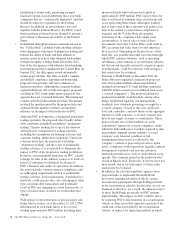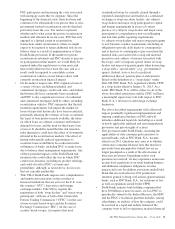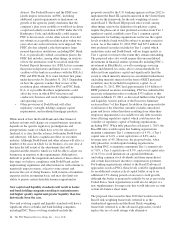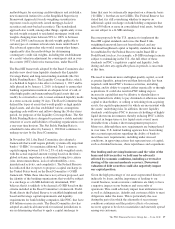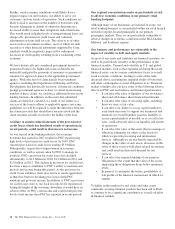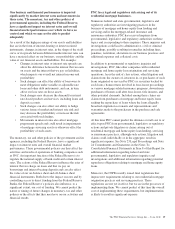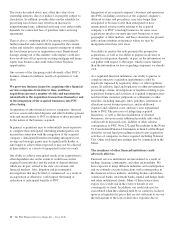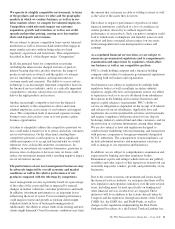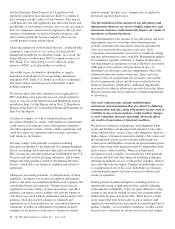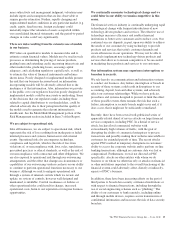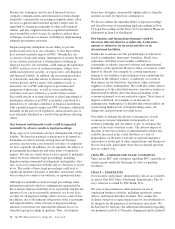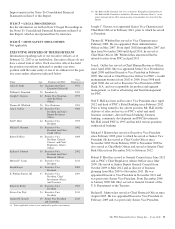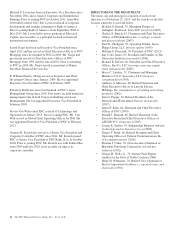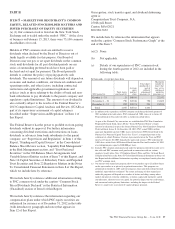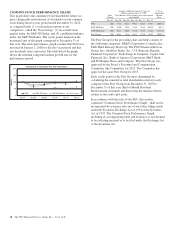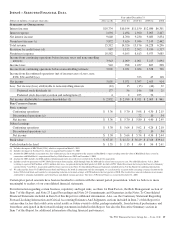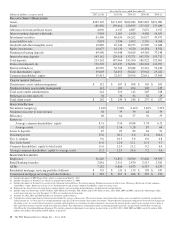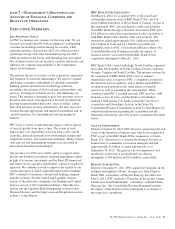PNC Bank 2012 Annual Report Download - page 40
Download and view the complete annual report
Please find page 40 of the 2012 PNC Bank annual report below. You can navigate through the pages in the report by either clicking on the pages listed below, or by using the keyword search tool below to find specific information within the annual report.We operate in a highly competitive environment, in terms
of the products and services we offer and the geographic
markets in which we conduct business, as well as in our
labor markets where we compete for talented employees.
Competition could adversely impact our customer
acquisition, growth and retention, as well as our credit
spreads and product pricing, causing us to lose market
share and deposits and revenues.
We are subject to intense competition from various financial
institutions as well as from non-bank entities that engage in
many similar activities without being subject to bank
regulatory supervision and restrictions. This competition is
described in Item 1 of this Report under “Competition.”
In all, the principal bases for competition are pricing
(including the interest rates charged on loans or paid on
interest-bearing deposits), product structure, the range of
products and services offered, and the quality of customer
service (including convenience and responsiveness to
customer needs and concerns). The ability to access and use
technology is an increasingly important competitive factor in
the financial services industry, and it is a critically important
component to customer satisfaction as it affects our ability to
deliver the right products and services.
Another increasingly competitive factor in the financial
services industry is the competition to attract and retain
talented employees across many of our business and support
areas. This competition leads to increased expenses in many
business areas and can also cause us to not pursue certain
business opportunities.
A failure to adequately address the competitive pressures we
face could make it harder for us to attract and retain customers
across our businesses. On the other hand, meeting these
competitive pressures could require us to incur significant
additional expense or to accept risk beyond what we would
otherwise view as desirable under the circumstances. In
addition, in our interest rate sensitive businesses, pressures to
increase rates on deposits or decrease rates on loans could
reduce our net interest margin with a resulting negative impact
on our net interest income.
The performance of our asset management businesses may
be adversely impacted by overall economic and market
conditions as well as the relative performance of our
products compared with the offerings by competitors.
Asset management revenue is primarily based on a percentage
of the value of the assets and thus is impacted by general
changes in market valuations, customer preferences and needs.
In addition, investment performance is an important factor
influencing the level of assets. Poor investment performance
could impair revenue and growth as existing clients might
withdraw funds in favor of better performing products.
Additionally, the ability to attract funds from existing and new
clients might diminish. Overall economic conditions may limit
the amount that customers are able or willing to invest as well
as the value of the assets they do invest.
The failure or negative performance of products of other
financial institutions could lead to a loss of confidence in
similar products offered by us without regard to the
performance of our products. Such a negative contagion could
lead to withdrawals, redemptions and liquidity issues in such
products and have a material adverse impact on our assets
under management and asset management revenues and
earnings.
As a regulated financial services firm, we are subject to
numerous governmental regulations and to comprehensive
examination and supervision by regulators, which affect
our business as well as our competitive position.
PNC is a bank holding company and a financial holding
company and is subject to numerous governmental regulations
involving both its business and organization.
Our businesses are subject to regulation by multiple bank
regulatory bodies as well as multiple securities industry
regulators. Applicable laws and regulations restrict our ability
to repurchase stock or to receive dividends from subsidiaries
that operate in the banking and securities businesses and
impose capital adequacy requirements. PNC’s ability to
service its obligations is dependent on the receipt of dividends
and advances from its subsidiaries. Applicable laws and
regulations also restrict permissible activities and investments
and require compliance with protections for loan, deposit,
brokerage, fiduciary, mutual fund and other customers, and for
the protection of customer information, among other things.
We are also subject to laws and regulations designed to
combat money laundering, terrorist financing, and transactions
with persons, companies or foreign governments designated
by U.S. authorities. The consequences of noncompliance can
include substantial monetary and nonmonetary sanctions as
well as damage to our reputation and businesses.
In addition, we are subject to comprehensive examination and
supervision by banking and other regulatory bodies.
Examination reports and ratings (which often are not publicly
available) and other aspects of this supervisory framework can
materially impact the conduct, growth, and profitability of our
businesses.
Due to the current economic environment and issues facing
the financial services industry, we anticipate that there will be
new legislative and regulatory initiatives over the next several
years, including many focused specifically on banking and
other financial services in which we are engaged. These
initiatives will be in addition to the actions already taken by
Congress and the regulators, through enactment of the Credit
CARD Act, the SAFE Act, and Dodd-Frank, as well as
changes to the regulations implementing the Real Estate
Settlement Procedures Act, the Federal Truth in Lending Act,
The PNC Financial Services Group, Inc. – Form 10-K 21



